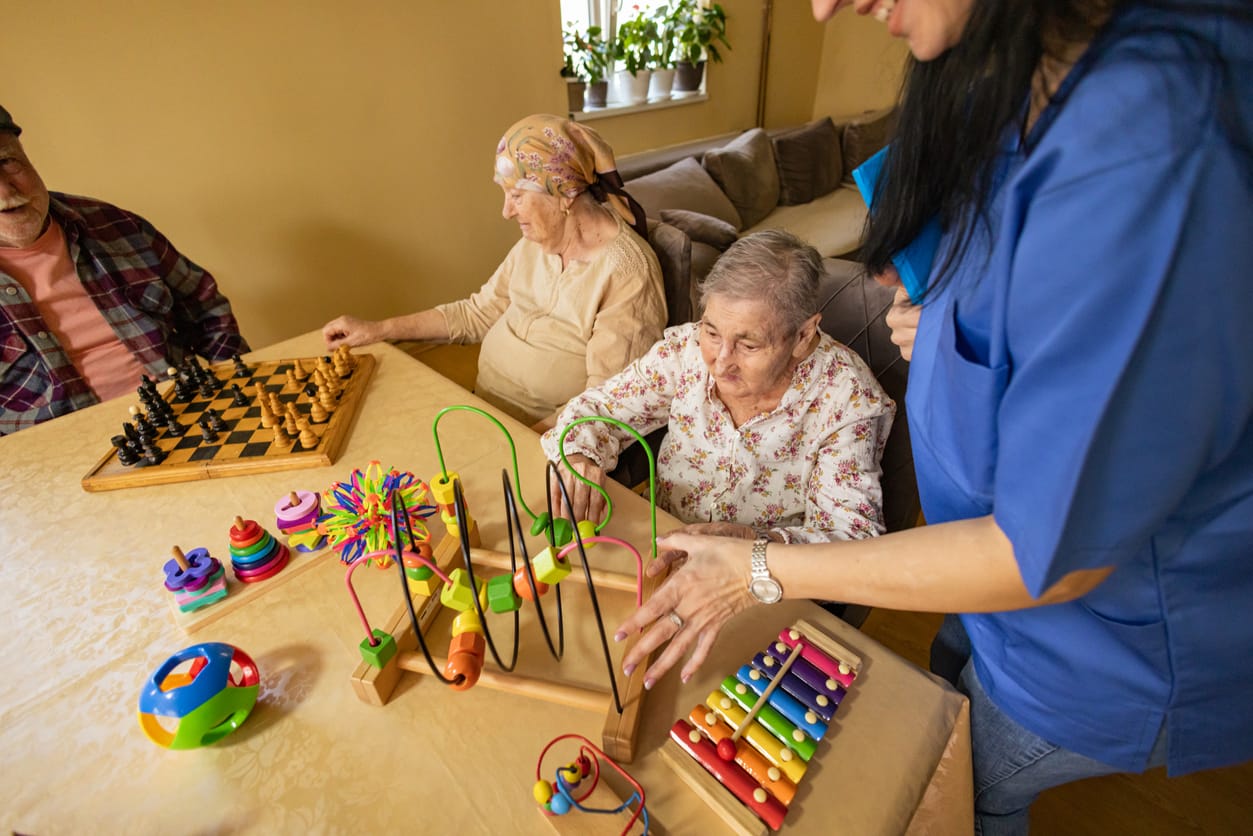Maintaining the mental and emotional well-being of seniors, especially those with Alzheimer’s disease, is crucial. This condition profoundly affects both seniors and caregivers, presenting unique challenges. Managing the emotional and practical aspects of caregiving while ensuring caregivers' own mental health can be demanding. Emphasizing proactive measures to support cognitive health, such as engaging in stimulating activities, establishing a consistent routine, and fostering a supportive environment, can significantly improve the quality of life for both seniors and caregivers.
Understanding Alzheimer’s Disease
Alzheimer’s disease is a progressive neurological disorder that impacts the cognitive functions of your senior loved ones, leading to a decline in memory, reasoning, and other mental abilities essential for daily life. It starts with mild symptoms such as memory loss and confusion but eventually progresses to more severe impairments, affecting the ability to perform routine tasks and maintain personal relationships. Understanding these symptoms can help us better support your loved ones as they navigate the challenges of this condition.
Risk factors for Alzheimer’s disease include age, genetics, and lifestyle choices. While aging is the primary risk factor, having a family history of the disease and certain genetic markers can increase vulnerability. Additionally, lifestyle factors like physical inactivity, poor diet, and lack of mental stimulation can heighten the risk. Early prevention and management, such as engaging in regular exercise, eating a balanced diet, and keeping the brain active, are essential. As caregivers, promoting these healthy habits can help mitigate the risk and potentially slow the progression of the disease, significantly benefiting your senior loved ones' overall well-being.
It's also important to recognize that Alzheimer’s disease is a growing public health crisis. According to the Alzheimer’s Association, over 6 million Americans are currently living with Alzheimer’s disease, and this number is projected to nearly triple by 2050. This alarming statistic underscores the urgency of early intervention and supportive care, making it crucial for caregivers to stay informed and proactive in managing the condition.
The Importance of Cognitive Exercises
Cognitive exercises are vital for maintaining the cognitive health of your senior loved ones, as they play a significant role in keeping the mind sharp and active. Engaging in mental exercises, such as puzzles, memory games, and brain-training apps, can help sustain cognitive functions and potentially delay the onset of Alzheimer’s disease. Research has shown that regular mental stimulation can improve brain health, contributing to a slower progression of cognitive decline and enhancing overall quality of life.
Benefits of Mental Stimulation
Mental stimulation offers a range of benefits that go beyond just cognitive enhancement. Incorporating cognitive exercises into daily routines can lead to:
- Improved Memory and Problem-Solving Skills: Regular engagement in mental activities can enhance memory retention and improve problem-solving abilities.
- Enhanced Mood: Stimulating the brain helps foster a more positive outlook, contributing to an overall better mood.
- Reduced Risk of Depression: Engaging in brain-stimulating activities lowers the risk of depression and helps seniors feel more engaged and fulfilled.
Types of Cognitive Exercises
Maintaining cognitive health in senior loved ones involves incorporating various types of cognitive exercises into their daily routines. These exercises not only help preserve mental acuity but also offer engaging and enjoyable ways to keep the brain active. By focusing on diverse activities that challenge different aspects of cognitive function, you can support your loved ones in staying mentally sharp and emotionally fulfilled. Here are some effective types of cognitive exercises to consider:
Memory Exercises
Memory exercises are essential for maintaining and enhancing the cognitive abilities of your senior loved ones. Simple activities like memorizing lists, names, or stories can provide valuable mental stimulation. Using mnemonic devices and engaging in memory games, such as matching pairs or word recall, helps strengthen memory recall and cognitive function. These activities not only support mental agility but also offer enjoyable ways to keep the mind active.
Problem-Solving Activities
Problem-solving activities, including puzzles, crosswords, and strategy games, are excellent for boosting cognitive health. Engaging in these types of exercises requires critical thinking and can significantly enhance problem-solving skills. Activities that challenge the mind, such as Sudoku or chess, promote mental sharpness and can also be a fun way to pass the time, keeping your loved ones mentally stimulated and engaged.
Learning New Skills
Encouraging seniors to take up new hobbies or learn a new language can be highly beneficial. Learning new skills fosters continuous cognitive development and curiosity. Whether it’s picking up a musical instrument, trying a new craft, or studying a foreign language, these activities keep the brain active and adaptable. Continuous learning helps maintain mental sharpness and offers a sense of accomplishment and fulfillment.
Social and Interactive Activities
Social and interactive activities are vital for overall cognitive health and emotional well-being. Participating in social events, group discussions, and community activities helps keep seniors socially engaged. Volunteering or joining clubs provides opportunities for meaningful interactions and can combat feelings of isolation. Encouraging active social participation supports both mental and emotional health, contributing to a more vibrant and fulfilling life.
Creating a Routine for Cognitive Exercises
Integrating cognitive exercises into the daily routines of your senior loved ones can significantly enhance their mental well-being. To make this easier, consider incorporating activities that they enjoy and are likely to stick with. For instance, start by setting aside specific times each day for brain-stimulating activities such as puzzles, memory games, or learning new skills. The key is to ensure that these exercises are seamlessly woven into their daily routine, making them a natural and enjoyable part of their day. Maintaining consistency while offering a variety of activities can help keep them engaged and prevent monotony.
Setting achievable and motivating goals for cognitive health is essential in creating an effective routine. Begin by establishing small, manageable goals that can be easily integrated into daily life, such as completing a crossword puzzle each morning or practicing a new hobby once a week. Encouraging small, consistent efforts over time is crucial for sustaining cognitive benefits. By celebrating small milestones and progress, you can keep your senior loved ones motivated and engaged, leading to sustained improvements in their mental health and overall quality of life.
It's important to note that cognitive stimulation can have a significant impact on brain health. A study published in the Journal of the American Medical Association found that engaging in mentally stimulating activities can reduce the risk of dementia by up to 35%. This highlights the critical role of cognitive exercises in maintaining mental sharpness and overall brain health as your loved ones age.
In conclusion, mental exercises are vital for supporting the cognitive health of seniors and can play a significant role in preventing or delaying Alzheimer’s disease. As family caregivers, integrating these activities into daily routines is crucial for maintaining mental sharpness and improving overall well-being. Staying informed and proactive in approach offers hope and support for families dealing with Alzheimer’s, ensuring the best possible care and enhancing the quality of life for those they cherish.





